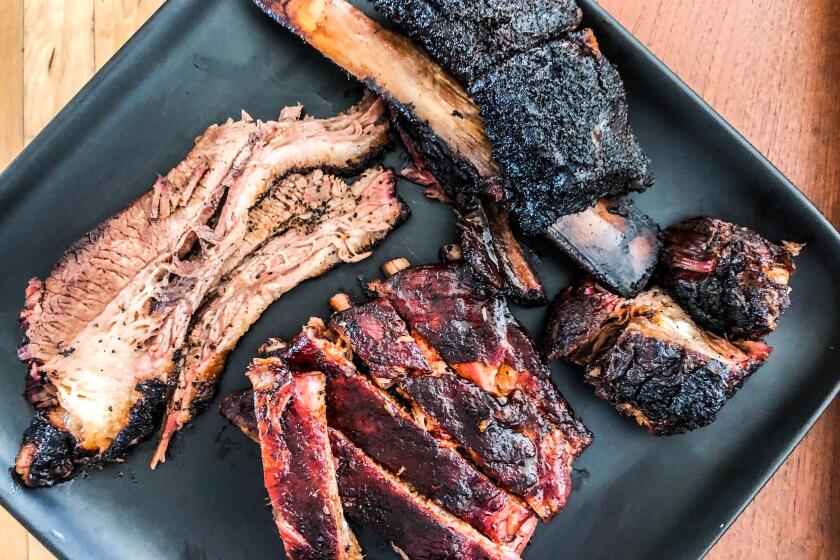A Word, Please: Should you use one, and where does it go? Apostrophes can be complicated

- Share via
If you have a good grasp of apostrophes, you probably notice that a lot of other people don’t. You could be forgiven for rolling your eyes at sentences like “The dog wagged it’s tail,” which incorrectly uses “it’s” instead of “its.” You might also notice people incorrectly using apostrophes to form plurals, like “I love mango’s.”
But that doesn’t mean you’re immune to apostrophe errors. Sometimes apostrophes are tough. Really tough. Here are six advanced apostrophe uses you’re probably getting wrong.
Attorneys general’s. Word-savvy people know the plural of “attorney general” is “attorneys general.” But if you wanted to make that possessive, where would you put the apostrophe? You might guess that because the first word takes the plural S, that’s where your possessive apostrophe should go. But you would be wrong. The correct form is “All the attorneys general’s cars are parked outside.” As the Associated Press Stylebook explains it, that’s because apostrophe and the S should come closest to the thing possessed, which in this case means the cars.
Two weeks’ notice. Technically, you can omit the apostrophe from this if you want. But in some styles, notably AP, that would be an error. Terms like two weeks’ notice, one day’s pay and five years’ probation are considered “quasi possessives.” That’s why they usually take possessive apostrophes.
The 1980s. It’s not uncommon to see people use apostrophes in decades: “the 1980’s.” But in the world of professional writing, that’s a no-no.
The ’80s. Besides showing possession, an apostrophe has a second job: standing in for omitted letters or numbers. Unfortunately, your word processing software doesn’t really get it. When you type an apostrophe before a word or number, Microsoft Word and other programs usually assume you wanted not an apostrophe, which curves almost like a backward letter C, but an opening single quotation mark, which curves with its opening to the right like the letter C. An easy fix: Type the apostrophe twice. Word will make the first one a single quotation mark but it will make the second one a proper apostrophe. Then just delete the first mark.
When it comes to choosing how to spell a word, check the dictionary or style guide for the better option. Consistency is key in publishing.
Farmers market. To the apostrophe-savvy, the lack of punctuation in “farmers market” looks wrong. But it’s not. The idea is that “farmers” is essentially an adjective in this construction. You can choose a different interpretation if you want, opting for “farmers’ market,” but you’ll be out of sync with professional writing. Whenever you’re wondering whether a term like “teachers college” or “homeowners insurance” takes an apostrophe, consider AP’s advice: “The apostrophe usually is not used if ‘for’ or ‘by’ rather than ‘of’ would be appropriate in the longer form: a radio band for citizens, a college for teachers, a guide for writers, a request by the Teamsters.” So no apostrophe in “teachers college,” “writers guide” or “homeowners insurance.”
Charles’, Charles’s. You already know that to make most regular singular nouns possessive you add an apostrophe plus an S: the cook’s preference. And you know that to make most plural nouns possessive you just add an apostrophe after the possessive S: the cooks’ preference. But when the singular noun ends with an S or when the noun is a proper name, all hell breaks loose. You can see “the boss’s hat,” “the boss’ seat,” “Charles’ job” or “Charles’s job” and, confusingly, these can all be correct. Different editing styles have different rules for forming possessives of singular nouns that end in S. For example, AP style says it’s Charles’ job but Chicago says it’s Charles’s job. AP piles on more complicated rules. For example, it has different rules for proper nouns like Charles, which take only an apostrophe (Charles’ job) and generic nouns like virus, which take an apostrophe plus an S (the virus’s effect). Want a simple method? Just include the S with all these singular possessives.
— June Casagrande is the author of “The Joy of Syntax: A Simple Guide to All the Grammar You Know You Should Know.” She can be reached at JuneTCN@aol.com.
All the latest on Orange County from Orange County.
Get our free TimesOC newsletter.
You may occasionally receive promotional content from the Daily Pilot.






